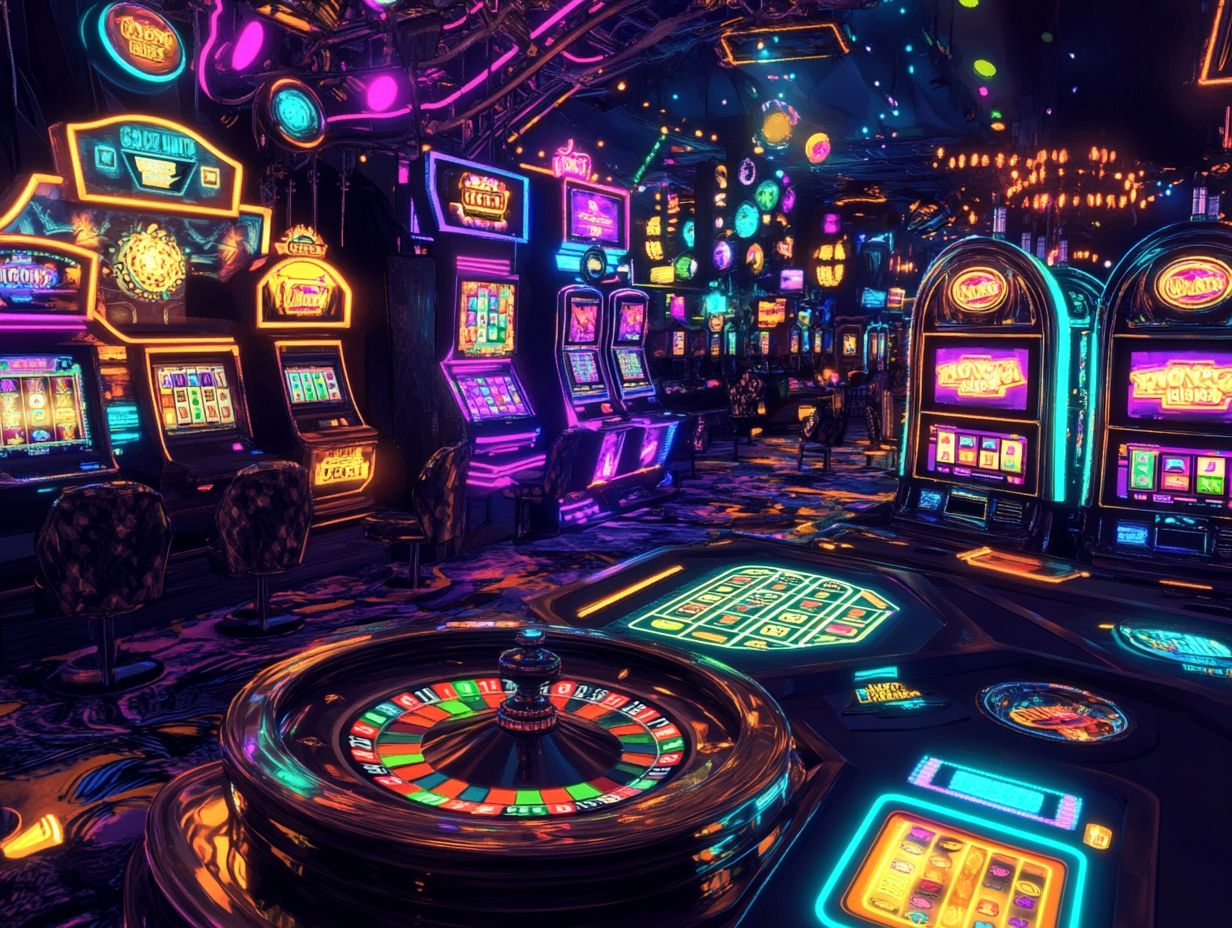Creating Your Perfect Online Casino Game: A Design Guide
Creating an online casino game is an exciting endeavor that combines creativity with strategy. To build a successful game, it is essential to understand your target audience and establish clear goals. This article explores the key elements involved in designing an engaging online casino experience, including selecting captivating themes and graphics, as well as integrating unique gameplay features that encourage players to return. Additionally, it discusses the importance of fairness and security, along with effective testing and marketing strategies for a successful launch. Join us on this journey to design your dream online casino game!
Understanding the Purpose of Your Dream Casino Game

The purpose of your online casino game is crucial to its success in a competitive market, as it influences every aspect of game design, user interface, and player engagement.
A well-defined purpose leads to effective monetization strategies and ensures alignment with market research insights, further highlighting the importance of clearly defining and adhering to your game’s objectives.
Developers and designers should consider several foundational objectives, including the identification of the game’s core goals and its intended purpose within the player experience.
As the purpose of the game is established, it becomes easier to make informed choices regarding features, mechanics, themes, and user interfaces.
Identifying Your Target Audience
Identifying the target audience for your online casino game is crucial for its success, as it ensures that the design, gameplay mechanics, and overall user experience are tailored to specific player preferences and behaviors.
These preferences and behaviors can vary based on factors such as age, gender, geographic location, and socio-economic status, as well as individual attitudes toward online gambling. By conducting comprehensive market research, developers can gather valuable insights into various demographics that will inform the game’s design.
Themes, rewards, and features can be fine-tuned based on the target audience’s gaming habits and preferences. Additionally, using surveys and player analytics can provide developers with direct feedback from users about what they enjoy most and what keeps them engaged.
This feedback can reveal both validation for existing concepts and uncover new ideas that developers may not have initially considered. For instance, targeting niche markets such as mobile gamers or high-stakes players allows developers to refine specific elements of the game with greater precision.
Incorporating integrated player feedback enables a design process that thrives on iterations. Each new version can incorporate insights gained from previous iterations, creating essential feedback loops that ensure informed and trend-sensitive decision-making.
Feedback can be solicited at various stages of the game development process, with different departments contributing their perspectives.
During the game design stage, developers can leverage feedback from players. In the programming phase, developers and IT teams can assess issues that players encountered in the previous version. Marketing and community managers will listen to user concerns and analyze the game’s reception at launch.
Even the customer support department can offer valuable insights; if they notice an increase in user inquiries about specific functions, it may indicate that those areas of the game are not intuitive enough.
Moreover, external companies can be engaged to evaluate the game and provide constructive feedback. Incorporating player feedback into the design process not only assists developers in their creative and technical endeavors but also fosters a community of users who feel more invested in the game.
When players see that their opinions have directly influenced the game’s design, they are more likely to offer their support and loyalty.
Defining the Goals and Objectives
The goals and objectives of an online casino game play a crucial role in defining its development process, ensuring that all elements of game design, mechanics, user interface, and user experience align with user expectations and enhance engagement.
Clear objectives create rewarding experiences that drive user engagement and foster loyalty through the use of engagement metrics and achievement systems.
To facilitate the development and implementation process, objectives for online casinos are typically categorized into three types:
- Player retention objectives
- Monetization objectives
- User engagement objectives
All three categories significantly influence design decisions. Strong player retention goals may lead to the creation of loyalty programs and regular rewards that incentivize gameplay, while monetization goals can result in in-game purchases or premium features.
User engagement objectives may inspire more interactive design elements, such as social sharing and dynamic tasks that offer rewards, thereby cultivating an ecosystem where players feel valued and motivated to return.
Designing the Look and Feel of Your Game

The appearance and experience of an online casino game result from a complex process that includes detailed game design, user interface design, and the creation of stunning graphics and animations. Additionally, incorporating sound design and visual effects can enhance the immersive experience, ensuring player engagement.
These elements work together to create an enticing environment for users. A well-developed user interface enhances usability, while thematic elements can align with the preferences of the target audience.
This alignment fosters increased player engagement through immersive designs that generate excitement and anticipation.
Choosing a Theme and Concept
The theme and concept of an online casino game are crucial as they significantly influence the game’s engagement level for players, affecting its mechanics, graphics, and narratives.
Themes can incorporate elements of fantasy or mythology, traditional casino gaming motifs, or innovative and unique concepts. A well-developed theme enhances the overall experience, making the game more captivating and enjoyable for players.
Creating Engaging Graphics and Animations
Engaging graphics and animations play a crucial role in enhancing the user interface of online casino games. They significantly influence player perceptions and contribute to a more immersive gameplay experience.
The quality of graphics and animations shapes players’ views of the game’s overall quality, impacting how long they choose to engage and how much they are willing to invest in interactive features and visual rewards. In today’s crowded market, the significance of visual elements cannot be overstated, as they enhance interactivity and encourage repeat play.
By providing realistic animations and stunning graphics, developers can create a vibrant and lifelike world, enriching the player’s experience. This level of immersion leads to increased engagement, as evidenced by metrics indicating improved user satisfaction; players are more likely to spend additional time in visually captivating environments.
By prioritizing these elements, retention rates can be significantly enhanced, and gameplay experiences can be elevated to new heights.
Developing the Gameplay and Features

The gameplay and features of your online casino game are crucial elements that significantly impact player satisfaction, retention, and engagement. Unique gameplay mechanics, such as those found in slot machines, card games, or live dealer games like poker and blackjack, can help distinguish your online casino game from competitors.
Elements such as skill-based gameplay, multiplayer options, and interactive features all contribute to creating an engaging experience. This, in turn, fosters repeat play and encourages social interaction among users.
Incorporating Unique and Exciting Features
Unique and exciting features of online casino games are essential for capturing player interest and fostering long-term engagement, as they enhance the overall experience and sense of community among players. Examples of features that improve player experience and community include multiplayer options, gamification, and reward mechanics, such as leaderboards and loyalty programs.
- Multiplayer: Providing players with the option to play with others increases the excitement and dynamism of the game. Multiplayer modes encourage interaction among players, boosting their sense of community and connection to the game.
- Gamification: Incorporating gamification elements, such as daily challenges, can motivate players to log in every day. This not only allows them to improve their skills but also rewards their efforts with special bonuses.
- Rewards Systems: Features like leaderboards, social sharing of achievements, and cooperative gameplay add a competitive edge that encourages players to invite friends to join. Loyalty programs that allow players to earn points redeemable for in-game benefits or real-life rewards further enhance this sense of community and connection.
Ensuring Fairness and Security
Fairness and security in online casino games refer to the levels of protection and randomness, often ensured by RNG (random number generator) technology, provided by an online gambling platform. Fairness ensures that games are played transparently, free from manipulation by either the house or the player, while security safeguards sensitive player information against external threats. In today’s crowded online casino market, fairness and security not only serve as essential features but also act as differentiators for casinos. There are several ways to promote these features:
- Trust through Licenses: Many online casinos, including those often referred to as “dream casinos,” highlight fairness and security in their marketing and branding efforts. The foundation of building a trustworthy brand lies in obtaining a license from a reputable gaming authority, such as the Malta Gaming Authority or the UK Gaming Commission. Such licenses offer players reassurance that the games, such as slot machines and card games, are regularly audited by third parties to ensure they are fair, safe, and compliant with required standards.
- Trust through Responsible Gaming Initiatives: Fairness and security extend beyond merely providing players a fair chance to win; they also involve demonstrating concern for player welfare and player psychology. Online casinos can be perceived as fair when they implement responsible gaming initiatives that limit the time and money players can spend on their platforms. Most online casinos offer tools that help players manage their gambling habits and adhere to responsible gaming practices.
- Trust through Regular Communication: Maintaining regular communication between the casino and its players fosters an environment of fairness and transparency. Online casinos should provide accurate updates on matters such as the frequency of dealer mistakes in live dealer games and the occurrence of specific numbers in roulette. This information should be presented in a manner that allows players to verify and evaluate it independently, thus enhancing player engagement.
- Fairness through Randomness Algorithms: Fairness is also about ensuring that the random number generators (RNGs) used to determine game outcomes are genuinely random and not predetermined. This is particularly crucial for online casinos that offer card games, slots, and dice games, including popular games like poker, blackjack, and roulette. Reputable online casinos employ algorithms that guarantee unpredictable and fair outcomes for these games, thereby ensuring a fair gaming experience.
- Fairness and Security through Encryption: To ensure a safe online experience, casinos must protect their players from hacking, scams, and malware attacks. Most casinos achieve this through Secure Socket Layer (SSL) encryption technology, which scrambles sensitive data, such as credit card details and passwords, before transmission over the internet. This level of security ensures the protection of in-game currency and other valuable assets, including cryptocurrency and NFTs.
- Fairness and Security through Technology: Many casinos go beyond basic security measures by implementing advanced fraud prevention systems that monitor unusual activity among players, vendors, and payment providers. By utilizing big data and artificial intelligence (AI), casinos can analyze gameplay and identify fair or fraudulent behaviors for future reference, enhancing the overall user experience and security features of the virtual environment.
In conclusion, fairness and security are vital components of a successful online casino. By fostering a culture of transparency, safety, and responsible gameplay, online casinos can provide players with a fair and effective gaming experience.
Testing and Launching Your Online Casino Game

Testing and launching your online casino game involves a rigorous phase of evaluation prior to its public release. This testing phase is crucial for ensuring that the game servers, gameplay mechanics, graphics, and user interface function correctly, as well as for identifying areas for improvement.
During this phase, developers will gather user feedback and utilize data analytics to assess player interactions with the game, focusing on aspects like mobile compatibility and cross-platform play. This information helps identify potential issues and allows for necessary adjustments before the official launch.
Overall, the testing and launching of your online casino game are vital steps that enable developers to ensure their product meets user expectations and adheres to industry standards.
Conducting Beta Testing and Gathering Feedback
Beta testing and user feedback are essential components of online casino game development prior to launch, as they provide valuable insights into player experiences and highlight areas for improvement.
By allowing players to test the game, developers can address issues related to performance optimization and enhance gameplay mechanics, graphics, and sound design through real user interactions. This process not only helps identify bugs and glitches but also uncovers nuances regarding user preferences and expectations that may have otherwise been overlooked.
Utilizing various testing methodologies, such as A/B testing and usability tests, offers a comprehensive understanding of how players receive different features, including themes and narrative elements. As feedback is collected and analyzed, designers can prioritize changes that will most significantly enhance the gaming experience and ensure accessibility for a diverse range of demographics.
Ultimately, an effective beta testing process is crucial for creating a user interface, content, and performance that are well-prepared for a successful launch.
Preparing for Launch and Marketing Strategies
The most critical phase of the online casino game development process is preparing for launch. The success of your online casino game largely hinges on effective user acquisition efforts, making it essential to plan and execute successful marketing strategies that attract and retain players.
Developers can generate interest in their game release and ensure steady user acquisition during the post-launch phase by utilizing promotions, community-building efforts, and targeted advertising.
One effective way to build excitement around the launch is to engage potential users through compelling social media campaigns. This approach allows developers to foster a community around their online casino game, and partnering with influencers within the gaming community can significantly enhance outreach. Special offers, such as free spins and loyalty bonuses, encourage early adoption, which is vital for establishing a loyal user base. Additionally, hosting interactive events or tournaments can enhance community engagement and motivate players to promote the game through word-of-mouth.
After the online casino game is launched, analyzing user feedback is crucial for refining the gaming experience and sustaining player interest. This ongoing evaluation is important for both retention and the continuous user acquisition process, ensuring that updates and patches align with current industry trends and technology advancements.





